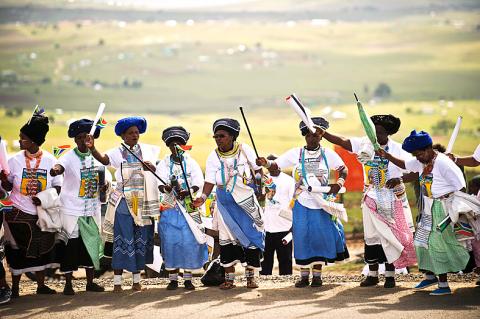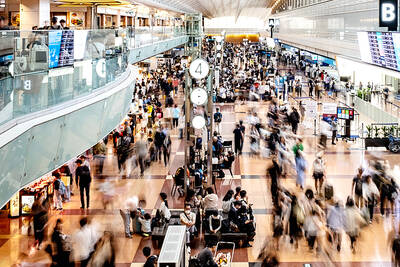Former South African president Nelson Mandela was laid to rest yesterday after a state funeral filled with tearful eulogies and strident vows to pursue his ideals of equality and justice.
Mandela’s casket was buried at his family plot in his rural boyhood home of Qunu, watched by his widow, Graca Machel, ex-wife Winnie Madikizela-Mandela, other family members and about 450 guests.
The interment followed a ceremonial state funeral that ran well over its allotted two hours, as speaker after speaker paid emotional tribute to the man who led South Africa out of the apartheid era.

Photo: AFP
“The person who lies here is South Africa’s greatest son,” African National Congress Deputy President Cyril Ramaphosa said in an opening address.
A 21-gun salute and full military honor guard had escorted Mandela’s coffin to the marquee, where 4,500 mourners said their final goodbyes.
His flag-draped casket was placed on cow skins, surrounded by 95 candles — each signifying a year of his extraordinary life.
The frail and aging leaders of South Africa’s anti-apartheid struggle also attended: George Bizos, former Anglican archbishop Desmond Tutu and Ahmed Kathrada, whose voice broke with as he delivered a eulogy for his old friend.
“I first met him 67 years ago,” said Kathrada, who along with Mandela was sentenced to life in prison in 1963.
He recalled his fellow inmate as a powerful amateur boxer who could cope far better than others with the physical challenge of hard labor.
“What I saw in hospital was a man helpless and reduced to a shadow of himself,” he said, struggling not to break down. “We can salute you as a fighter for freedom. Farewell my dear brother, my mentor, my leader. Now I’ve lost a brother, my life is in a void and I don’t know who turn to.”
His words left many in tears among the invited guests, whose ranks included foreign dignitaries and celebrities ranging from Britain’s Prince Charles to US talk show queen Oprah Winfrey.
While Mandela had been critically ill for months, the announcement of his death on Dec. 5 still sent a spasm through a country struggling to carry forward his vision of a harmonious multi-racial democracy of shared prosperity.
During the funeral, South African President Jacob Zuma told the country to carry on his legacy.
“One thing we can assure you of today Tata [father], as you take your final steps, is that South Africa will continue to rise. South Africa will continue to rise because we dare not fail you,” Zuma said.
After the ceremony, Mandela’s coffin was transported to a graveyard sitting on the sprawling family estate Mandela built in Qunu after his release from prison in 1990.
“It was in that village that I spent some of the happiest years of my boyhood and whence I trace my earliest memories,” he wrote in his autobiography.
As the coffin was lowered into the ground, a formation of military aircraft — six jets with one spot left vacant in a symbol of a missing man — flew overhead. After a life spent in the public spotlight, Mandela’s final rites were a private affair.
A family deprived of their husband and father during his 27 years in apartheid prisons and many more years in public service seized it as an intimate last goodbye to a man who meant much to millions.
A live television broadcast followed the coffin to the graveside, but was cut after several minutes in line with the family’s wishes.

CHIPMAKING INVESTMENT: J.W. Kuo told legislators that Department of Investment Review approval would be needed were Washington to seek a TSMC board seat Minister of Economic Affairs J.W. Kuo (郭智輝) yesterday said he received information about a possible US government investment in Taiwan Semiconductor Manufacturing Co (TSMC, 台積電) and an assessment of the possible effect on the firm requires further discussion. If the US were to invest in TSMC, the plan would need to be reviewed by the Department of Investment Review, Kuo told reporters ahead of a hearing of the legislature’s Economics Committee. Kuo’s remarks came after US Secretary of Commerce Howard Lutnick on Tuesday said that the US government is looking into the federal government taking equity stakes in computer chip manufacturers that

NORTHERN STRIKE: Taiwanese military personnel have been training ‘in strategic and tactical battle operations’ in Michigan, a former US diplomat said More than 500 Taiwanese troops participated in this year’s Northern Strike military exercise held at Lake Michigan by the US, a Pentagon-run news outlet reported yesterday. The Michigan National Guard-sponsored drill involved 7,500 military personnel from 36 nations and territories around the world, the Stars and Stripes said. This year’s edition of Northern Strike, which concluded on Sunday, simulated a war in the Indo-Pacific region in a departure from its traditional European focus, it said. The change indicated a greater shift in the US armed forces’ attention to a potential conflict in Asia, it added. Citing a briefing by a Michigan National Guard senior

POWER PLANT POLL: The TPP said the number of ‘yes’ votes showed that the energy policy should be corrected, and the KMT said the result was a win for the people’s voice The government does not rule out advanced nuclear energy generation if it meets the government’s three prerequisites, President William Lai (賴清德) said last night after the number of votes in favor of restarting a nuclear power plant outnumbered the “no” votes in a referendum yesterday. The referendum failed to pass, despite getting more “yes” votes, as the Referendum Act (公民投票法) states that the vote would only pass if the votes in favor account for more than one-fourth of the total number of eligible voters and outnumber the opposing votes. Yesterday’s referendum question was: “Do you agree that the Ma-anshan Nuclear Power Plant

ENHANCED SECURITY: A Japanese report said that the MOU is about the sharing of information on foreign nationals entering Japan from Taiwan in the event of an emergency The Ministry of Foreign Affairs yesterday confirmed that Taiwan and Japan had signed an agreement to promote information exchanges and cooperation on border management, although it did not disclose more details on the pact. Ministry spokesman Hsiao Kuang-wei (蕭光偉) said the ministry is happy to see that the two nations continue to enhance cooperation on immigration control, in particular because Taiwan and Japan “share a deep friendship and frequent people-to-people exchanges.” “Last year, more than 7.32 million visits were made between the two countries, making it even more crucial for both sides to work closer on immigration and border control,” he said. Hsiao